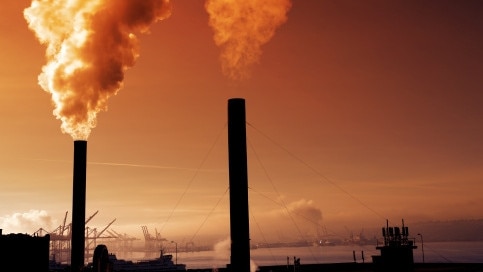Banks warn climate change ‘material financial risk’ to business
A third of our 38 largest banks, insurance companies and super funds believe climate change is a “material financial risk”.

A third of the 38 largest Australian banks, insurance companies and superannuation funds believe climate change is an immediate “material financial risk” to their businesses while a further 20 companies believe it will be a risk in the future, according to the prudential regulator.
In the first survey of its kind, the Australian Prudential Regulation Authority found all of the 38 large institutions it surveyed were taking steps to understand the threat of climate change, with a majority of banks considering climate-related financial risks as part of their management frameworks.
It comes hot on the heels of a declaration last week from Reserve Bank deputy governor Guy Debelle that climate change and the conversion to a low-carbon economy or a world with more erratic weather events would have “first-order economic effects” that require an immediate but orderly transition to ensure financial stability.
According to the survey, four of seven large banks said energy-related risks were the most pertinent, while one bank said rising sea levels was its highest risk. Insurance companies were most concerned by physical risks, such as floods and cyclones. Life insurance companies were concerned by greater risk of heat stress in customers, along with risks of rising regulatory change and the threat of floods.
APRA executive board member Geoff Summerhayes said the regulator was responsible for ensuring financial companies were alive to the issues that could impact their ability to fulfil contracts with customers.
“The world is rapidly transitioning to a low carbon economy, driven principally by the decisions of governments, business leaders, investors and consumers. Companies that fail to respond to these forces risk being left behind,” Mr Summerhayes said.
“APRA’s views on the economic risks of climate change, recently echoed by the Reserve Bank of Australia, are consistent with those of financial regulators internationally. These risks are material, foreseeable and actionable now. Uncertainty over long-term impacts or policy direction is not an excuse for doing nothing,” he said.
In a landmark speech in Sydney last week, Mr Debelle said the RBA was using climate change data in its macroeconomic models and had joined a global group of central banks called the Network for Greening the Financial System to better understand the impact of a warming planet.
The current drought in Australia has cut farm output by 6 per cent and reduced economic growth by 0.15 per cent, a drag on the economy Mr Debelle said would continue this year.
APRA said the reputational damage, flooding, regulatory changes and cyclones were nominated as the top climate-related financial risks.
The physical risks presented by climate change, such as greater damage caused to assets and property from extreme weather events impact the economy and financial markets through supply chain disruption, lower productivity and falling asset prices. Transition risks as the business world adjusts to a lower carbon environment involve companies being vulnerable to changes to regulation, technological obsolescence, and also legal risks from the prospect of boards ignoring the risks climate change presents.
“There is a high degree of certainty that financial risks will materialise, and entities can mitigate the magnitude of the impacts of these risks through action in the short term,” APRA said. “Similarly, APRA has noted that it is imprudent for entities or regulators to ignore such risks just because there is uncertainty, or even controversy, about the policy outlook.”
Mr Debelle last week was the third leading regulator to speak on climate change at the Centre for Policy Development in three years, after Mr Summerhayes warned business directors were legally liable if they didn’t factor climate change into their business plans, a position endorsed a year later by the Australian Securities & Investments Commission’s John Price.
The survey results come after The Australian revealed today that the country’s most flood-prone areas are also the country’s most marginal electorates, but both the Morrison government and Labor have failed to adopt a Productivity Commission proposal to invest in flood mitigation which would save billions in post-disaster relief.



To join the conversation, please log in. Don't have an account? Register
Join the conversation, you are commenting as Logout